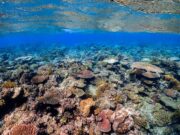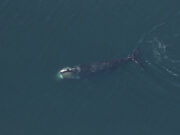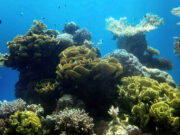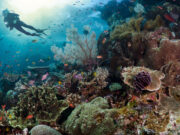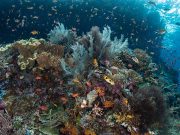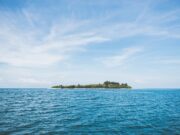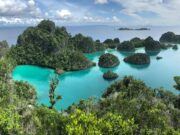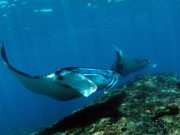Good news for Indonesia’s shark sanctuary: sharks and other fish are more abundant within zones with fishing restrictions according to a new study. Bad news for the people who fish for a living – they sometimes turned to crime to make ends meet.
Vanessa Jaiteh examined the impact of no-take zones on both sharks and people inside a recently established shark sanctuary along the coastal area of Raja Ampat, Indonesia. Working with local scientists from The Nature Conservancy, she measured the abundance of sharks and other fishes within two no-take zones (where fishing was prohibited) and one open access zone where fishing for sharks and other species continued unabated. The no-take zones were established by Misool Eco Resort in partnership with local communities with traditional land and sea rights to the area. Predictably, abundance levels for all fishes – mackerels, tunas, snappers, groupers and sharks – were much higher in the no-take zones when compared to the open access area.

The second phase of the study – an examination of perceptions and behavioral changes in people from coastal communities – revealed that most people living outside Raja Ampat, but travelling to fish in this regency, were unsure of why sharks were being protected. In interviews conducted with people simultaneously with field surveys on sharks and fish, respondents felt that government agencies were not considering their dependence on fishing for existence. Also, participants in the survey indicated that fishing closures not only forced them to shift their activities to unprotected areas, but also prompted some to engage in illicit activities such as the trafficking of illegal petrol.
“In some areas, ecotourism centered on sharks and coral reefs actually provides a livelihood alternative to fishing,” said Jaiteh. “However, we now realize that it also may be shifting fishing pressure to other areas and promoting illegal activity. Only a multi-dimensional effort focused on both protection of sharks and livelihood security will achieve sustainable results, with benefits to both overharvested marine life and coastal fishing communities.”
Higher Abundance of Marine Predators and Changes in Fishers’ Behavior Following Spatial Protection within the World’s Biggest Shark Fishery, Front. Mar. Sci., 07 April 2016


